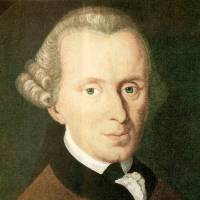Immanuel Kant Blamed for Shooting in Russia
 Immanuel Kant
Immanuel Kant
Dead for 209 years, the idealist German philosopher Immanuel Kant (1724-1804) is being blamed for a shooting in Russia on September 14, although authorities admit beer was involved as well. Ironically, Kant developed a system of morality based on reason that included rules—called “categorical imperatives,”—that he believed hold true in all circumstances, regardless of context.
The shooting occurred in Rostov-on-Don, a city of one million in southern Russia that has a longstanding reputation as a haven for organized crime and violent behavior. A well-known Russian folk-song even laments: “Ah, Odessa, Odessa mother, Rostov-papa sends hellos! There are so many [criminal] jobs to do here, and nobody gets any rest!”
During Rostov’s annual City Day celebration, two men in their 20s waiting in line at a beer stand began discussing Kant, the conversation became heated, fists flew, and one philosopher shot the other with a rubber bullet. The shooter—apparently ignoring Kant’s injunction that a free man must take responsibility for his acts—fled the scene but was caught by police. The victim is recovering from his injuries in a local hospital.
Kant, whose dense prose and abstract ideas have tortured philosophy students for generations, seems an odd cause for violent disagreement, and it is not yet publicly known exactly what issue incited such violent ferocity.
In fact, Kant may have had little to do with it. According to Moscow-based journalist Natalia Antonova, a friend living in Rostov reacted with little surprise: “What’s so special about it? In Rostov-on-Don, young men will use any excuse to pounce on each other. It’s how they display their dominance. If they can do it over some random chick or if they don’t like each other’s haircuts, why not do it over Kant?”
At the same time, Kant’s philosophy of ethics, which holds that some things are impermissible regardless of the context or the consequences, has actually been at the root of several recent policy debates.
To take the most obvious example, Kant’s categorical imperative rules out torture, which can never be moral or ethical; in contrast, utilitarian ethics says that torture might be acceptable when its goal is important enough. In rejecting this idea that “the end justifies the means,” Kant urged that human beings are ends in themselves.
In contemporary terms, in debating the U.S. use of torture in the years after 2001, Sen. John McCain (R-Arizona) is a Kantian, while Vice President Dick Cheney (R) is a utilitarian.
It is possible, of course, that the two men were simply drunk, and Kant was no more than an excuse to have a fight.
-Matt Bewig
To Learn More:
Nerds Gone Wild: Argument Over Philosopher Kant Ends in Shooting (by Natalia Antonova, Ria Novosti)
When Philosophers Attack! (by David Edmonds, BBC)
- Top Stories
- Unusual News
- Where is the Money Going?
- Controversies
- U.S. and the World
- Appointments and Resignations
- Latest News
- Musk and Trump Fire Members of Congress
- Trump Calls for Violent Street Demonstrations Against Himself
- Trump Changes Name of Republican Party
- The 2024 Election By the Numbers
- Bashar al-Assad—The Fall of a Rabid AntiSemite






Comments